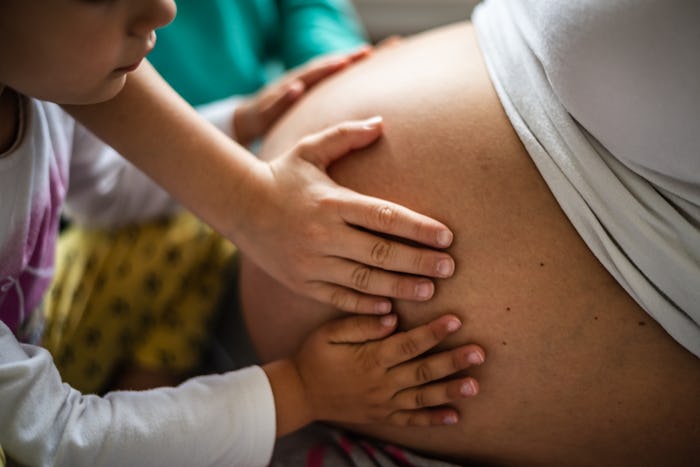Second Pregnancies

Can Toddlers Tell When Labor Is Near? A Pediatrician Explains
So there you are, days from your due date, bags packed and ready to go, when out of nowhere your toddler becomes fussy and starts clinging to you like you're about to board a Space X solo mission. What's up? Is it just separation anxiety, or can toddlers somehow tell when labor is near?
There are many message boards filled with anecdotes of toddlers turning into pint-sized oracles right before mom goes into labor, as if the kids somehow just know their little toddler world is about to be turned upside down by a screeching little brother or sister. There are even instances where children have (according to the message board members) correctly predicted the day of baby's arrival. On the What to Expect message board, a mother wrote: "My 4yo told me about a week before our baby was born that the baby was coming on Sunday 'after swimming lessons and family day'. She even drew a picture of the baby on the calendar for that day. I went into labor late Sunday night/Monday morning."
Which I admit, makes the 'ol hairs on the arms stand at attention. But before we encourage toddlers everywhere to set up their own psychic hotlines, is there any evidence that toddlers really do have some special "sense" about labor?
Dr. Whitney Casares is a pediatrician, and the author of The New Baby Blueprint: Caring for You and Your Little One. She tells Romper that while she isn't aware of any scientific studies on the subject, toddlers being tuned into labor isn't so surprising. "It does make sense that toddlers might feed off of the nervous energy second-time moms-to-be often have as they make last-minute preparations for a new baby and as they listen to their parents discuss imminent labor and delivery plans."
She points out the many different elements of "change" that toddlers are observing include "parents’ stress levels, shifts in household furniture arrangements as nurseries are assembled, an onslaught of new gifts in the home meant for a new family member — these might all trigger a toddler’s change in behavior leading up to labor."
So, it probably isn't that your child possesses psychic uterus abilities, but more that the kid is just very tuned in to the general anxiety/stress in the house. There is lots of evidence to suggest that kids are affected by their parents' stress — there's an entire book on the subject, in fact.
However, the nervousness and anxiety surrounding the birth of another child is of course totally normal, and nothing parents should feel bad about. That said, it's still a good idea to try and limit stressful convos to when little ones are out of earshot. And Casares says parents should also do what they can to help prepare toddlers for the upcoming changes.
"Make sure to spend special time with your toddler doing activities she is accustomed to at regular intervals before baby arrives — going on stroller walks, playing with toys in your family room, and listening to music. Reassure your child that you’ll always be his parent, and continue the special time moments after your new baby arrives. A gift from baby to an older sibling can also engender a sense of endearment toward a new brother or sister."
So yes, if all else fails, bring on the bribes. (Kidding.) But in all seriousness, a "sibling gift" can help ease toddler jealousy. Etsy even has some very cute Big Brother/Big Sister Gift boxes that include little treats like magnets and crayons, as well as some sweet "activity sticks" that offer suggestions for how a toddler can "help" with the new baby. Things like "sing baby a song" or "tell baby about shapes." Hopefully they won't result in "try to put sticks in new baby's eyes", though maybe hang close just in case...
Expert:
Dr. Whitney Casares, M.D., M.P.H., pediatrician, author of The New Baby Blueprint: Caring for You and Your Little One, and founder of www.modernmommydoc.com
This article was originally published on